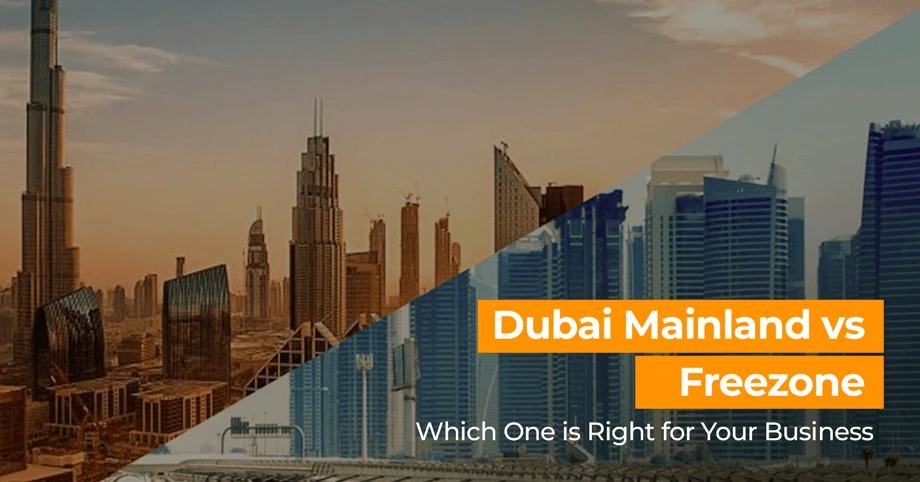Choosing the right location for your business setup in Dubai is crucial for its success and growth. Two of the most popular options, and having a tight competition of free zone vs mainland Dubai, are setting up in the UAE. Each has its own set of advantages, regulatory frameworks, and considerations. This guide will help you understand the key difference between Freezone and Mainland and make an informed decision for your business in 2024.
Dubai Mainland
Overview
Dubai Mainland is governed by the Department of Economic Development (DED). Businesses in the mainland can operate across Dubai and the UAE without any restrictions. This flexibility appeals to many businesses.
Advantages
-
Market Access: Access to the entire UAE market
-
Business Activities: Ability to trade directly with the local market and bid on government contracts.
-
Location: Option to establish an office anywhere in Dubai.
-
Flexibility: No limitations on the number of visas that can be obtained.
Disadvantages
-
Ownership: Historically, foreign investors were required to have a local sponsor who holds 51% of the shares. However, recent reforms have allowed 100% foreign ownership in many sectors.
-
Regulations: Subject to UAE commercial laws and regulations.
Free Zones
Overview
Free Zones are special economic zones designed to attract foreign investments with attractive incentives. Each Freezone is governed by its own regulatory authority.
Advantages
-
Ownership: 100% foreign ownership allowed.
-
Tax Benefits: Exempt from import and export duties, personal income tax, and corporate tax for a specific period.
-
Repatriation of Profits: You can send all your profits and capital back home.
-
Industry-Specific: Free Zones often cater to specific industries, providing tailored support and infrastructure.
Disadvantages
-
Market Access: Limited ability to trade directly with the local UAE market. Requires a local distributor.
-
Location: Restricted to specific areas within the Freezone.
-
Regulations: Must adhere to the regulations of the Freezone authority.
Key Considerations
Nature of Business
Consider whether your business needs to operate within the UAE market or if it will primarily engage in international trade.
Ownership Structure
Decide if full foreign ownership is a priority for you. Free Zones offer this benefit, while the mainland has some sectors that now allow 100% foreign ownership.Is one of the difference between freezone and mainland
Cost
Evaluating the cost implications, including setup costs, office rentals, and ongoing operational expenses is a common factor in free zone vs mainland dubai.
Visa Requirements
Consider the number of visas required for your staff. Mainland businesses typically have more flexibility in this aspect compared to Freezones.
Steps to Establish Your Business
-
Determine Your Business Activity: Identify the nature of your business and the type of license required.
-
Choose the Location: Decide between mainland and Freezone based on your business needs.
-
Prepare Documentation: Gather necessary documents such as passport copies, business plans, and initial approvals.
-
Apply for License: Submit your application to the relevant authority (DED for mainland, respective authority for Freezone).
-
Office Space: Secure office space in your chosen location.
-
Visa Processing: Apply for the necessary visas for your employees.
FAQs
Q: Can I have 100% ownership of my business in Dubai Mainland?
A: Yes, recent reforms have allowed 100% foreign ownership in many sectors within Dubai Mainland.
Q: What are the tax benefits of setting up in a Freezone?
A: Free Zones offer various tax benefits, including exemptions from import/export duties, personal income tax, and corporate tax for a specific period.
Q: Can a Freezone company trade within the UAE market?
A: Freezone companies can trade within the UAE market only through a local distributor or by establishing a branch in the mainland.
Q: What is the difference in visa policies in the free zone vs mainland Dubai?
A: Mainland businesses generally have more flexibility in terms of the number of visas that can be issued compared to Freezones.
Q: Are there industry-specific Free Zones in Dubai?
A: Yes, many Free Zones cater to specific industries such as media, technology, finance, and healthcare, offering tailored support and infrastructure.
Q: How long does it take to set up a business in a free zone vs mainland Dubai?
A: The setup time can vary depending on the specific requirements and documentation but typically ranges from a few days to a few weeks.
Q: What are the ongoing costs of maintaining a business in a free zone vs mainland Dubai?
A: Ongoing costs include license renewals, office rent, and compliance with regulatory requirements. Free Zones may have additional costs for specific services.
Q: Can I convert my Freezone company to a Mainland company?
A: Yes, it is possible to convert a Freezone company to a Mainland company, but it involves regulatory procedures and adherence to mainland regulations.
Q: Is it possible to operate from a virtual office in a Freezone?
A: Many Free Zones offer virtual office options, providing a business address and essential services without the need for a physical office space.
Q: What are the main regulatory authorities for businesses in a free zone vs mainland Dubai?
A: The Department of Economic Development (DED) governs mainland businesses, while each Freezone has its own regulatory authority.
Conclusion
Choosing between Dubai Mainland and Freezone depends on your business needs, ownership preferences, and market focus. By understanding the key differences and benefits of each, you can make an informed decision that aligns with your strategic objectives for 2024. Comparing the difference between Freezone and Mainland will help you determine the best option. When considering free zones vs Dubai mainland, evaluate the specific advantages each offers to find the right fit for your business setup.
